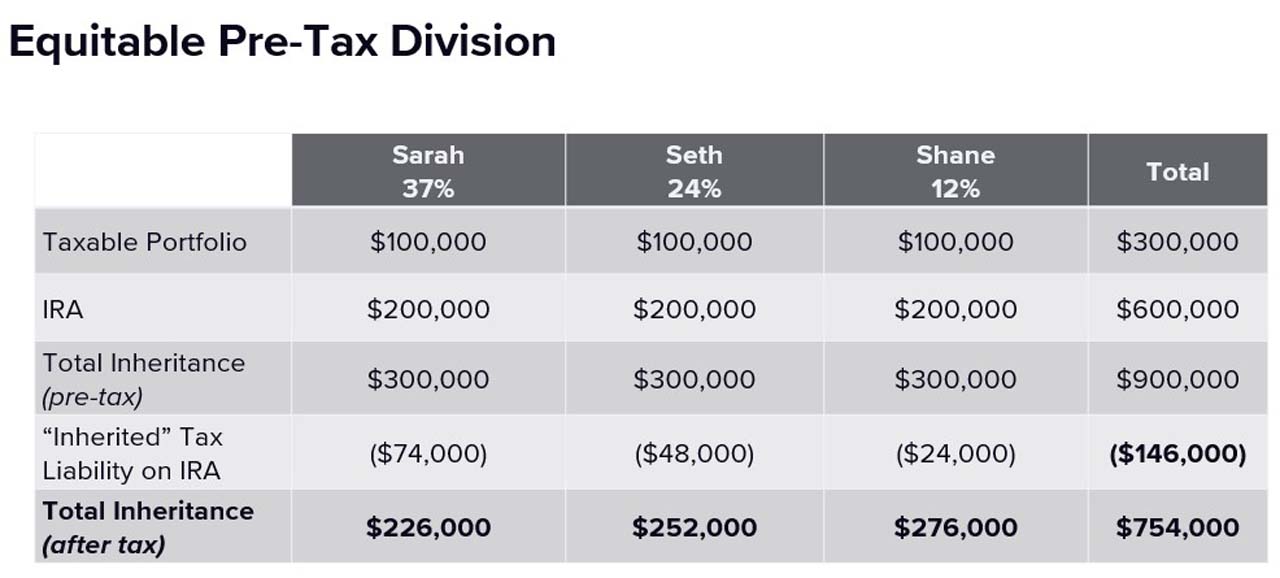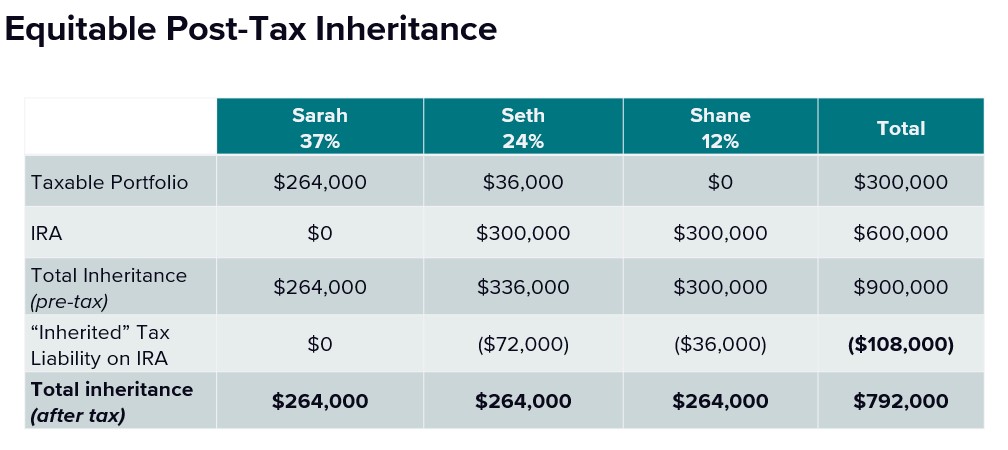Equal Shares for Heirs? Not Unless You Take Taxes into Account
Unless your estate plan takes your beneficiaries' own finances into account, you could be shortchanging some thousands of dollars ... and throwing money away unnecessarily on taxes.


Profit and prosper with the best of Kiplinger's advice on investing, taxes, retirement, personal finance and much more. Delivered daily. Enter your email in the box and click Sign Me Up.
You are now subscribed
Your newsletter sign-up was successful
Want to add more newsletters?

Delivered daily
Kiplinger Today
Profit and prosper with the best of Kiplinger's advice on investing, taxes, retirement, personal finance and much more delivered daily. Smart money moves start here.

Sent five days a week
Kiplinger A Step Ahead
Get practical help to make better financial decisions in your everyday life, from spending to savings on top deals.

Delivered daily
Kiplinger Closing Bell
Get today's biggest financial and investing headlines delivered to your inbox every day the U.S. stock market is open.

Sent twice a week
Kiplinger Adviser Intel
Financial pros across the country share best practices and fresh tactics to preserve and grow your wealth.

Delivered weekly
Kiplinger Tax Tips
Trim your federal and state tax bills with practical tax-planning and tax-cutting strategies.

Sent twice a week
Kiplinger Retirement Tips
Your twice-a-week guide to planning and enjoying a financially secure and richly rewarding retirement

Sent bimonthly.
Kiplinger Adviser Angle
Insights for advisers, wealth managers and other financial professionals.

Sent twice a week
Kiplinger Investing Weekly
Your twice-a-week roundup of promising stocks, funds, companies and industries you should consider, ones you should avoid, and why.

Sent weekly for six weeks
Kiplinger Invest for Retirement
Your step-by-step six-part series on how to invest for retirement, from devising a successful strategy to exactly which investments to choose.
If you’re like a lot of the people I help, you probably have an estate plan that distributes assets equally between family members. On its face, it seems like the right, fair thing to do — if you have three kids, you leave them each one third. Unfortunately, the outcome might not be what you intended, unless each of your children pays the same marginal tax rate, which is an unlikely scenario.
Failing to account for differences in your beneficiaries’ tax situations can leave you with two unintended and unpleasant consequences:
Let’s talk about how this can happen and what you can do to avoid it.
From just $107.88 $24.99 for Kiplinger Personal Finance
Become a smarter, better informed investor. Subscribe from just $107.88 $24.99, plus get up to 4 Special Issues

Sign up for Kiplinger’s Free Newsletters
Profit and prosper with the best of expert advice on investing, taxes, retirement, personal finance and more - straight to your e-mail.
Profit and prosper with the best of expert advice - straight to your e-mail.
Tax Basics of Inherited Assets
When you inherit an investment account you will also inherit the income tax liability that comes with it. Tax-deferred and taxable accounts, however, have very different tax implications for your beneficiaries.
With tax-deferred accounts, like an IRA, the balance you see is not what your beneficiaries get. That’s because a substantial portion of the money in tax-deferred accounts will go to the IRS (and potentially your state) in the form of the taxes you deferred at the time you contributed to the account. For a typical person, it’s not uncommon to only “own” 65% of an IRA, while taxes claim the other 35% over time. Unfortunately, the tax liability on this money never ends, as your beneficiaries will inherit it and are stuck paying the tax bill over their lifetimes as distributions occur.
Taxable investment accounts are treated differently than tax-deferred accounts. With a taxable account, taxes are paid annually on interest and dividends in addition to any realized capital gains. When you pass, the cost basis of the assets is “stepped-up” to the fair market value, thereby eliminating any unrealized gains for your heirs, which could result in a huge tax advantage. This allows your beneficiaries to inherit the account with no embedded income tax liability.
The Hidden Cost of Equally Dividing Your Assets
An estate plan that equally divides its assets generally assumes that all beneficiaries have the same financial situation. The problem is that’s rarely the case. The hidden cost of equally dividing your assets is that each beneficiary’s tax liability is different, which means the amount they each inherit after taxes will be unequal. When beneficiaries have different income tax rates, the type of assets they inherit is crucial to maximizing the total inheritance.
Consider a married couple with three children, named Sarah, Seth and Shane.
- Your beneficiaries don’t actually end up receiving equal amounts, and
- More taxes are paid than necessary.
- Sarah is a doctor who is taxed at the 37% marginal tax rate.
- Seth is an IT consultant who is taxed at the 24% tax rate.
- Shane is a teacher who is taxed at the 12% tax rate.
The parents have $900,000 in assets ($600,000 in an IRA and $300,000 in a taxable account), and their estate plan directs these assets to be left equally to their three children. Since the children have vastly different tax situations, however, the inheritance each child actually receives after you deduct the “inherited” tax liability is clearly unequal — to the tune of $50,000.

Notice the results of the equitable pre-tax division of assets. While all three children started with $300,000, after taxes Sarah gets $226,000, Seth gets $252,000 ($26,000 more than his sister) and Shane gets $276,000 ($50,000 more than Sarah and $24,000 more than Seth). Not only did the unequal post-tax inheritance not align with the parents’ intent, but a total of $146,000 went to taxes.
In this example, the main cause for the unequal inheritance was the IRA. Remember, the higher a beneficiary’s tax rate, the larger the share Uncle Sam claims, making the IRA a less than desirable asset for the beneficiary with the highest tax rate.
Rather than leaving their children an equal distribution, the parents meet with their tax adviser to create a more equitable and tax-efficient inheritance strategy. Because of Sarah’s higher tax rate, they should avoid giving her any of the IRA. Instead, her inheritance is composed entirely of assets from the taxable account, where she’ll get a much bigger benefit from the “step-up” in cost basis than her siblings. Seth, being in the middle tax bracket, receives a blend of IRA and taxable assets. Shane, being in the lowest tax bracket, receives an inheritance entirely composed of the IRA.

In this scenario, each beneficiary receives a different initial amount, Sarah gets $264,000, Seth gets $336,000 and Shane gets $300,000. What looks to be an unequal pre-tax inheritance at first glance is nearly equal after taxes are considered. Not only that, the total tax paid was $38,000 less than in the equal division of assets scenario.
It Takes Planning to Transform Unequal to Equitable
Most estate plans are not designed to be optimized for income taxes. While it may be beneficial to incorporate this type of planning into your estate, it must be balanced with the practical requirements of implementing such a strategy. Distributing assets unequally is a complex process requiring a high degree of financial knowledge, ongoing review, revisions as circumstances change, coordination among involved parties and the willingness to have potentially difficult conversations. Consider the following when planning for your estate:
- Decide how much each beneficiary should receive: Do you want each of your beneficiaries to receive the same amount before or after taxes? If one child receives more than the others (from a pre- or post-tax perspective), will that create friction among your children?
- Make tax-smart allocations: In general, beneficiaries with higher tax rates often benefit from receiving assets from a taxable account (but not always). Conversely, those with lower tax rates are often better to bear the burden of the “inherited” IRA tax liability. Just remember, in order to maintain a tax-efficient distribution your beneficiary allocations may need to adjust over time as a beneficiary’s tax rate changes.
- Explain any inequalities: Before you pass, be clear with your children about your inheritance plan. If one child is going to receive more or less than their siblings, make sure to explain the rationale while you are still alive. If your plan isn’t made clear, it opens the door for conflict among your kids in the future.
- Fund charitable bequests with retirement accounts: If philanthropy is part of your estate plan, consider funding your charitable intent with IRA assets. Since the tax rate for charities is 0%, the income tax liability related to those accounts can completely disappear when the charity is the beneficiary.
- Lifetime Roth conversions: Depending on your beneficiaries’ tax rates, it may be better for you to incur the taxes on your retirement savings so they are passed on with no tax liability. This can be done by converting all, or a portion of, your traditional IRA to a Roth IRA during your lifetime. All future growth of any assets in a Roth IRA is tax-free to both you and your beneficiaries.
Smart income tax planning incorporates the benefits and costs across multiple generations, but don’t let your focus on limiting taxes get in the way of a happy transition when you pass. A balance of strategic tax decisions versus keeping things as simple as possible will help you achieve the right balance of both goals.
Estate plans rarely consider the tax impact to the eventual beneficiaries. When discussing this with a financial adviser, kick off the conversation with these two questions:
- What is the hidden tax cost of your current estate plan?
- What amount of tax liability will each of your beneficiaries inherit?
The opinions voiced in this material are for general information only and are not intended to provide specific advice or recommendations for any individual. This information is not intended to be a substitute for specific individualized tax advice. We suggest that you discuss your specific tax issues with a qualified tax advisor. Neither Wealth Enhancement Group nor LPL financial provides tax advice.
Profit and prosper with the best of Kiplinger's advice on investing, taxes, retirement, personal finance and much more. Delivered daily. Enter your email in the box and click Sign Me Up.

Brian Vnak is Vice President, Wealth Enhancement Group, advising clients on income, gift, trust and estate tax issues.
-
 Nasdaq Leads a Rocky Risk-On Rally: Stock Market Today
Nasdaq Leads a Rocky Risk-On Rally: Stock Market TodayAnother worrying bout of late-session weakness couldn't take down the main equity indexes on Wednesday.
-
 Quiz: Do You Know How to Avoid the "Medigap Trap?"
Quiz: Do You Know How to Avoid the "Medigap Trap?"Quiz Test your basic knowledge of the "Medigap Trap" in our quick quiz.
-
 5 Top Tax-Efficient Mutual Funds for Smarter Investing
5 Top Tax-Efficient Mutual Funds for Smarter InvestingMutual funds are many things, but "tax-friendly" usually isn't one of them. These are the exceptions.
-
 Social Security Break-Even Math Is Helpful, But Don't Let It Dictate When You'll File
Social Security Break-Even Math Is Helpful, But Don't Let It Dictate When You'll FileYour Social Security break-even age tells you how long you'd need to live for delaying to pay off, but shouldn't be the sole basis for deciding when to claim.
-
 I'm an Opportunity Zone Pro: This Is How to Deliver Roth-Like Tax-Free Growth (Without Contribution Limits)
I'm an Opportunity Zone Pro: This Is How to Deliver Roth-Like Tax-Free Growth (Without Contribution Limits)Investors who combine Roth IRAs, the gold standard of tax-free savings, with qualified opportunity funds could enjoy decades of tax-free growth.
-
 One of the Most Powerful Wealth-Building Moves a Woman Can Make: A Midcareer Pivot
One of the Most Powerful Wealth-Building Moves a Woman Can Make: A Midcareer PivotIf it feels like you can't sustain what you're doing for the next 20 years, it's time for an honest look at what's draining you and what energizes you.
-
 I'm a Wealth Adviser Obsessed With Mahjong: Here Are 8 Ways It Can Teach Us How to Manage Our Money
I'm a Wealth Adviser Obsessed With Mahjong: Here Are 8 Ways It Can Teach Us How to Manage Our MoneyThis increasingly popular Chinese game can teach us not only how to help manage our money but also how important it is to connect with other people.
-
 Looking for a Financial Book That Won't Put Your Young Adult to Sleep? This One Makes 'Cents'
Looking for a Financial Book That Won't Put Your Young Adult to Sleep? This One Makes 'Cents'"Wealth Your Way" by Cosmo DeStefano offers a highly accessible guide for young adults and their parents on building wealth through simple, consistent habits.
-
 Global Uncertainty Has Investors Running Scared: This Is How Advisers Can Reassure Them
Global Uncertainty Has Investors Running Scared: This Is How Advisers Can Reassure ThemHow can advisers reassure clients nervous about their plans in an increasingly complex and rapidly changing world? This conversational framework provides the key.
-
 I'm a Real Estate Investing Pro: This Is How to Use 1031 Exchanges to Scale Up Your Real Estate Empire
I'm a Real Estate Investing Pro: This Is How to Use 1031 Exchanges to Scale Up Your Real Estate EmpireSmall rental properties can be excellent investments, but you can use 1031 exchanges to transition to commercial real estate for bigger wealth-building.
-
 Should You Jump on the Roth Conversion Bandwagon? A Financial Adviser Weighs In
Should You Jump on the Roth Conversion Bandwagon? A Financial Adviser Weighs InRoth conversions are all the rage, but what works well for one household can cause financial strain for another. This is what you should consider before moving ahead.